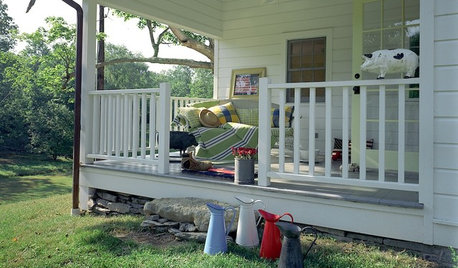To Permit or not to permit, that IS a question!
bamboome2007
13 years ago
Featured Answer
Sort by:Oldest
Comments (36)
texaskitchentoo
13 years agoRelated Discussions
Quick permitting question
Comments (2)In my area for "general construction" there is the general permit, then there are two specific trade permits; electrical and plumbing. As far as inspections, the number can vary based upon the scope of work. A large project could have a series of inspections: If concrete work (for a foundation) there may be a footing inspection. Then a framing inspection. Then the trade (plumbing and electrical) inspections. Then an inspection prior to the walls being drywalled. Then a final for the certificate of occupancy to be issued. A small bathroom remodel might have one inspection prior to the walls being closed up, one for the flood test, and maybe a final when everything is done. It really depends on the town as well as the individual. I had a guy that checked me randomly and then he hardly ever showed his face again. He knew my work, he had no worries. He even tried to hire me to build his house. On the other end we had a guy another town over that showed up all the time on random days and would demand that all work stop and everyone vacate the house when he showed up. He though he was OSHA, the FBI, Immigrations, and Oprah Winfrey all wrapped into one. Right. He changed his ways quickly. You could visit your building department, tell them the scope of your project, and ask what types of inspections you could expect to be carried out for a job that size. Then ask to see your property's file. In there should be copies of your permits and a list of the types of inspections that were done on your property and the dates they were carried out....See MoreQuestion about Permitting
Comments (2)Leave sleeping dogs lie. Garages are not habitable space. The municipality you live in will have required minimum standards for covered off-street parking. Should the wall impede that, do you really want to remove it. Creating a separate enclosed space has required light and ventilation requirements, do you meet them....See MoreSelling house - permit question
Comments (1)Permits are usually the owner's responsibility. In some states contractors have limited agency in order to do all necessary permitting, but the ultimate responsibility still falls to the owner. My advice is to call the county permitting office and talk to them. It is entirely possible the contractor is right and the county made a clerical error (it happens more than you would imagine). You may not need to do anything else, they may make a phone call to the contractor to close it out. But now that you have talked to the contractor talk to the county. It is most likely a very minor thing to get fixed, don't make a big deal out of it yet....See MoreLouisiana slab code & permitting questions.
Comments (2)Garages are not plopped on site with no consideration to site elevations and access. I could plop that down on the west side of the house and have to do 30 trucks of compacted fill to get it be flat enough for an easy “on grade” entry that would work with a realistic driveway route. Hire a local contractor if you want experienced local advice. Otherwise, you’ll get to make the same expensive mistakes and red tags that your local contractor made in order to get that experience....See Morecindyandmocha
13 years agopurplepansies
13 years agopudgybaby
13 years agoformerlyflorantha
13 years agoUser
13 years agosabjimata
13 years agosvwillow1
13 years agogsciencechick
13 years agobabushka_cat
13 years agologic
13 years agomichellemarie
13 years agojrueter
13 years agobostonpam
13 years agozazutoo
13 years agonishka
13 years agozeebee
13 years agokitchenaddict
13 years agolazy_gardens
13 years agojanwad
13 years agoglenster_jr
13 years agoLinda Gomez
13 years agobamboome2007
13 years agowestsider40
13 years agobillandterry
13 years agobabushka_cat
13 years agobamboome2007
13 years agosegbrown
13 years agobabushka_cat
13 years agologic
13 years agoberone
13 years agobamboome2007
13 years agowestsider40
13 years agochrisk327
13 years agotitan7
13 years ago
Related Stories

CONTRACTOR TIPSBuilding Permits: When a Permit Is Required and When It's Not
In this article, the first in a series exploring permit processes and requirements, learn why and when you might need one
Full Story
CONTRACTOR TIPSBuilding Permits: 10 Critical Code Requirements for Every Project
In Part 3 of our series examining the building permit process, we highlight 10 code requirements you should never ignore
Full Story
CONTRACTOR TIPSBuilding Permits: The Submittal Process
In part 2 of our series examining the building permit process, learn what to do and expect as you seek approval for your project
Full Story
CONTRACTOR TIPSBuilding Permits: What to Know About Green Building and Energy Codes
In Part 4 of our series examining the residential permit process, we review typical green building and energy code requirements
Full Story
CONTRACTOR TIPSYour Complete Guide to Building Permits
Learn about permit requirements, the submittal process, final inspection and more
Full Story
CONTRACTOR TIPSBuilding Permits: The Final Inspection
In the last of our 6-part series on the building permit process, we review the final inspection and typical requirements for approval
Full Story
CONTRACTOR TIPSBuilding Permits: The Inspection Process
In Part 5 of our series on home building permits, we explore typical inspection schedules for a variety of project types
Full Story
WORKING WITH PROS10 Questions to Ask Potential Contractors
Ensure the right fit by interviewing general contractors about topics that go beyond the basics
Full Story
REMODELING GUIDESConsidering a Fixer-Upper? 15 Questions to Ask First
Learn about the hidden costs and treasures of older homes to avoid budget surprises and accidentally tossing valuable features
Full Story
WORKING WITH PROS9 Questions to Ask a Home Remodeler Before You Meet
Save time and effort by ruling out deal breakers with your contractor before an in-person session
Full StorySponsored
Columbus Area's Luxury Design Build Firm | 17x Best of Houzz Winner!






bamboome2007Original Author